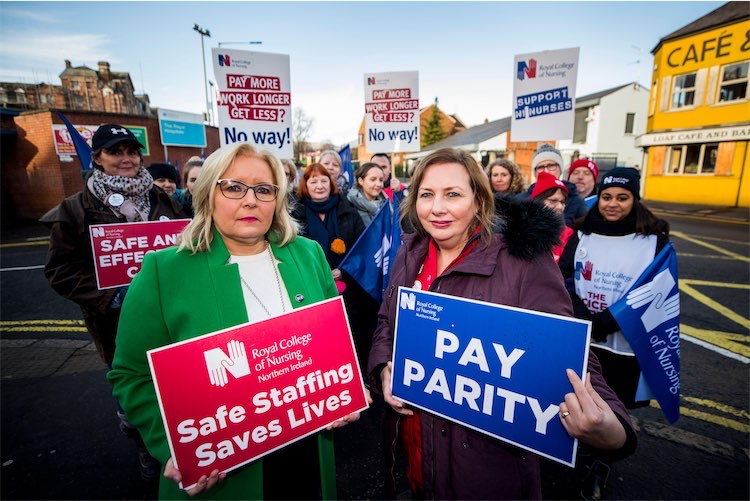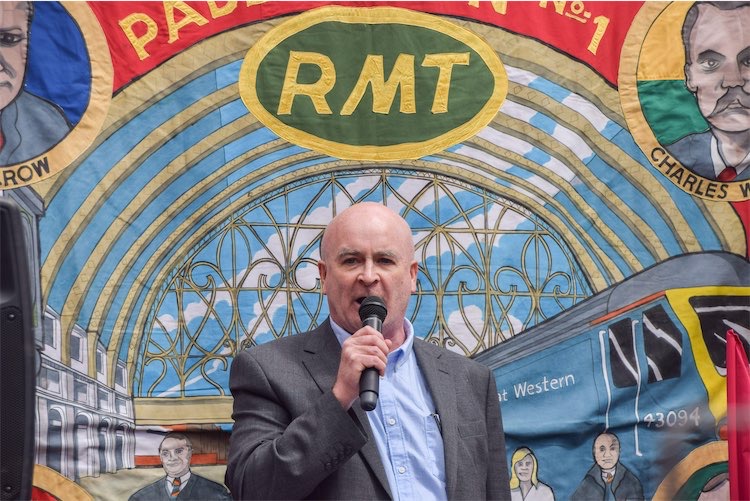Unions "Won't Rest" In Fight For Pay Deals After Success For NHS And Rail
Healthcare, education and rail unions have made significant progress in talks after multiple strikes over the winter (Alamy)
8 min read
The year began with the highest levels of industrial action in decades, with nurses, junior doctors, ambulance workers, rail operators, teachers, university staff, and civil servants shivering on the picket lines in their fight for improved pay and conditions – sometimes almost all at once.
But as spring finally arrives, it seems the so-called ‘winter of discontent’ might be starting to thaw with healthcare, education and rail unions making significant progress in recent weeks.
A new pay offer for some NHS workers from Health Secretary Steve Barclay includes a 5 per cent pay rise from April and a minimum pay increase to £11.45 an hour. In addition, thousands of staff will receive a one-off bonus worth up to 8.2 per cent for this financial year. Members will now be balloted on the offer and most health unions will recommend they accept it.
This week the latest wave of rail strikes was suspended after members of the RMT union at Network Rail voted to accept a pay offer that includes an uplift on salaries of between 14.4 and 9.2 per cent.
But the unrest is by no means over yet, and while many union leaders welcome the steps forward, the underlying issues of the cost of living crisis, and some notable disputes, remain. The Office for Budget Responsibility’s (OBR) forecast which accompanied the recent Spring Budget predicted that household disposable income would see its biggest two year fall since records began in 1956/57, with a fall of 5.7 per cent over the 2022/23 and 2023/24 financial years.
In April, junior doctors will stage a 72-hour walk-out after talks broke down between the health secretary and medics union the British Medical Association (BMA) this week.
Health unions who have reached settlements have been critical of how long it took the government to engage in “proper” pay talks, during which time thousands of NHS appointments were cancelled.
Earlier this year Royal College of Nursing’s (RCN) General Secretary Pat Cullen accused Prime Minister Rishi Sunak of making “false promises” after he called for a “reasonable dialogue” with unions, and it took several rounds of talks before any resolution was reached.
 Nurses have gone on strike multiple times over the winter (Alamy)
Nurses have gone on strike multiple times over the winter (Alamy)
While Cullen ultimately welcomed this month’s settlement for nurses, her comments announcing a deal with the government following “tough negotiations” indicated any victory was minimal and hard won.
“The government was forced into these negotiations and to reopen the pay award as a result of the historic pressure from nursing staff,” she said.
“It is not a panacea, but it is real tangible progress and the RCN’s member leaders are asking fellow nursing staff to support what our negotiations have secured.”
Other health workers are not as happy with the deal, with one representative of a cross-union group saying it “goes nowhere near what we set out to achieve”. They are campaigning for members to reject it.
Huge questions also remain on where the Department of Health will find the money to fund the enhanced pay deal with no new money allocated from the treasury. The health secretary confirmed he needs to find £4bn in spare cash to fund it, noting that it is likely to come from "areas of underspend".
Frustration extends beyond the healthcare sector. Paul Nowak, general secretary of the Trade Unions Congress (TUC), which represents 5.5 million multi-sector workers across 48 unions, also feels it should not have taken months of strikes to get the government to finally engage.
“All of the current public sector disputes could have been resolved long ago had ministers chosen to negotiate in good faith and reach agreement on a fair pay rise,” Nowak told PoliticsHome.
He said the TUC would stand behind any unions who continue to strike in the absence of “fair pay negotiations”, and that “the ball is firmly in the government's court” to move beyond the further industrial dispute in sectors where there has been minimal dialogue with government.
“All of our unions stand ready to meet for talks. It’s up to ministers to make this happen,” he said.
Nowak accused the government of a “divide and rule” approach which he believed prioritises some sectors over others. “Now is not the time for political games,” he added.
“Unions won’t rest until every single public sector worker gets fair pay.”
That includes civil servants and other public body workers such as border staff, according to Mark Serwotka, general secretary of the PCS, the UK’s sixth largest trade union.
Serwotka has warned that PCS will continue their strike escalation in the absence of enhanced pay offers. The union is calling for a ten per cent pay rise with a minimum rate of £15 an hour. So far, they have only been offered three per cent after 11 consecutive years of pay lower than the rate of inflation, which Serwotka argues amounts to a real terms pay cut of 20 per cent.
Thousands of civil servants walked out on the day of the Spring Budget, and PCS have now announced that more than 1,000 Passport Office workers will go on strike for five weeks, which is likely to have a "significant impact" on the delivery of passports ahead of the summer.
“We’ve said there must be money now,” Serwotka told PoliticsHome. “There must be progress on a commitment that they're not going to cut people's redundancy terms.”
Serwotka said he has met with ministers multiple times, but only to communicate demands rather than engage in meaningful talks, meaning little real progress can be made.
“What happens with the ministers is they say they are meeting you and listening, and then nothing happens,” he said.
He believed the government had made a “political” choice to strike a deal with health unions. Polling consistently shows people take the side of NHS workers over government when it comes to industrial disputes.
“The government seems more interested in the politics than actually getting resolutions,” he continued.
“This will drag on – we are planning for this to continue, because not making progress is not an option.
“The buildup of pressure is huge. It's been a winter of resistance: There is a crisis in in-work poverty, and it's a really good thing that people are fighting back.
“All these strikes can be stopped tomorrow if the government does what it needs to, which is to have proper talks and put some money on the table. And that's the choice that they are currently refusing to make.”
A government spokesperson said: "Industrial action should always be a last resort.
"The government will continue to engage constructively with trade unions and is prepared to agree reasonable and affordable settlements if unions come to the table and cancel strikes, as we have done with both NHS unions and the RMT in recent weeks."
 The latest wave of rail strikes was suspended after members of the RMT union at Network Rail voted to accept a pay offer (Alamy)
The latest wave of rail strikes was suspended after members of the RMT union at Network Rail voted to accept a pay offer (Alamy)
With living standards declining, the government’s decision to introduce the Strikes (Minimum Service Levels) Bill, which aims to weaken strikes by enforcing minimum service during public sector strikes, has faced vehement opposition from unions and the Labour Party, who have called it a violation of human rights and international law.
“We are determined to fight this tooth and nail – including through the courts,” Novak said.
While Labour, traditionally the party of workers, has faced criticism for not explicitly supporting the strikes, the TUC leader praised their decision to instead focus their attention on repealing the Bill if they were to get into government. He said this showed a “solid commitment” in support of unions. The party has also published a ‘New Deal for Working People’ plan which promises to ban zero hours contracts and outlaw exploitative working practices such as fire and rehire.
Serwotka was more critical of Labour’s position, however, and said Keir Starmer’s opposition to his MPs joining picket lines was “an entirely self-inflicted own goal”.
“The problem with that approach is you don't motivate people that there's something positive to change,” the PCS leader explained.
“It can lead to a lot of people deciding they're not going to vote. They're missing the opportunity to put out a radical vision of what they want, so I do think they're playing it too safe.”
Public opinion is generally in favour of improving worker pay and conditions. A recent Ipsos poll found that support was high for public sector strikes, including 60 per cent for nurses, 58 per cent for ambulance workers, 51 per cent for junior doctors, and 32 per cent for railway workers.
As much of the winter unrest looks likely to linger into the summer months, the question for government and unions alike is whether it will remain that way now that key disputes seem settled.
